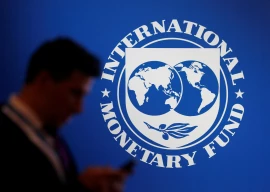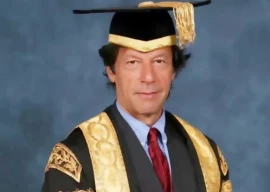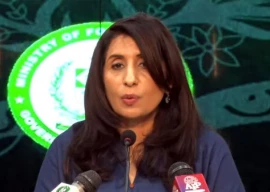
The second Women Journalists Convention organised by the Karachi Union of Journalists (KUJ) was aptly opened with Farida Gulzar’s explication of Surah An-Nisa (The Women) and how it exhorted people to tell the truth. Next, Abida Farheen reminded the audience, which was thin in the first session, of some of the greats in the field such as Razia Bhatti, Iron Woman Tawakul Karman and Rehana Hakim.
Soofiya Yazdani of the PFUJ said she was happy that this was a space, where for a short while women, could hear each other talk because otherwise they were mostly talked to. A reporter from the audience suggested that some sort of awards should be given to high achievers in the field.
In a remark that would have made any feminist theorist proud, one reporter asked what the KUJ was possibly doing for freelance journalists, who perhaps occupy the margin of margins in the mediascape.
Tabinda Lari, one of the first women on PTV radio, struck a note, which was echoed by several other speakers, that a woman cannot be harrassed unless she allows it.
Huma Qureshi of Jasarat mentioned how flexible working hours had allowed her to tend to her family and work equally and this was something that needed to be institutionalised. One editor quipped that in her career she had seen that it was the men and not the women who had badgered her for more “facilities”.
Among the audience were women who had turned up looking for jobs in journalism as well. One of the pieces of advice given was that they could ask newspapers to employ them after they
proved themselves during an unpaid internship. It was also ironic that during the first session, as the hour approached 1pm some male protesters outside the club started shouting slogans over the megaphone, drowning out the voices of the women inside.
In the second session, after lunch, provincial minister Shazia Marri advised women to face the challenges of their field. “I know that it is difficult for a woman to travel in public transport but if she has the will to move ahead then she can face it.”
“It is wrong to say that women have less strength which is why they can’t work like men,” she added. “If a woman can face the pain of labour then it means that she has more strength than anyone.” She added that harrassment was faced by women in all societies, but we highlighted it in order to get more funding.
Journalism teacher at IoBM Shahida Kazi told newcomers to the field that the best teacher was the newspaper. She said she had spent her entire career trying to impress upon new journalists that it was imperative for them to actually read the paper if they wanted to write. She also refuted the notion that there was a glass ceiling, by citing the examples of scores of women who were editors. “It is not the attitude of the men, people and the family which need to change, rather it is the attitude of the woman which needs to be changed,” she remarked.
Kazi has come a long way. She was one of Pakistan’s first women reporters and they used to call her the Meena Bazaar reporter. She looked visibly upset when she asked the audience why there were so few women working as reporters today when 90% of the Mass Communication and Journalism classes are filled with them. What is happening to them after they graduate, she asked.
Journalist Humaira Motala went so far as to say that in the field men did not help women but tried to become their ‘godfathers’. She also brought up the bias in male journalists who do not give women important beats or bylines.
Indeed the numbers speak for themselves - if not of bias but at least of the fact that not enough women are in reporting. Excluding foreign correspondents, on Friday The News gave 36 men bylines for reporting but in the entire paper only one woman got a byline. In The Express Tribune there were 29 male bylines and only three for women and in Dawn 29 men got their names next to their stories compared to two women.
Published in The Express Tribune, October 15th, 2011.
Correction: An earlier version of this article incorrectly mentioned IoBM as IBM. The correction has been made.
COMMENTS (4)
Comments are moderated and generally will be posted if they are on-topic and not abusive.
For more information, please see our Comments FAQ
1725354252-0/Untitled-design-(5)1725354252-0-405x300.webp)



1721376111-0/BeFunky-collage-(15)1721376111-0-165x106.webp)
1725355686-0/Untitled-design-(32)1725355686-0-270x192.webp)


1725352563-0/Untitled-design-(8)1725352563-0-270x192.webp)
1725352489-0/Untitled-design-(35)1725352489-0-270x192.webp)
1725351242-0/Untitled-design-(7)1725351242-0-270x192.webp)

1725083820-0/Untitled-design-(24)1725083820-0-270x192.webp)










dear all this was a good effort by Karachi Union of Journalists to organize this convention it will help both men and women to make a professional and cordial relation ship with harred both side.
I guess... stop debating over gender issues... and start focusing on journalistic standards. Every Tom, Dick and Harry is pursuing journalism these days. Journalism demands a unique attitude which cannot come from studies alone, it needs to be learned through experience. There are more than 70 percent girls studying in Mass Communication department today, but that percentage is of no use. Majority of them are a laughing stock with just a few actually pursuing their education with some sense and hard work. Others have fallen in their with a lucky percentage. Kindly bring standard to education. Being a female journalism graduate...I do not face problem because of my gender, rather the hopeless education and professional standards of journalism practiced here.
What a disappointing news writing!!... Reporter + Editor please put some more hard work. There's a big in fact huge difference between IBM and IoBM, Shahida Kazi belongs to IoBM. Kindly revise this piece...it has so many flaws.
Don't give up. Highest respect for all who belong to my mothers gender.